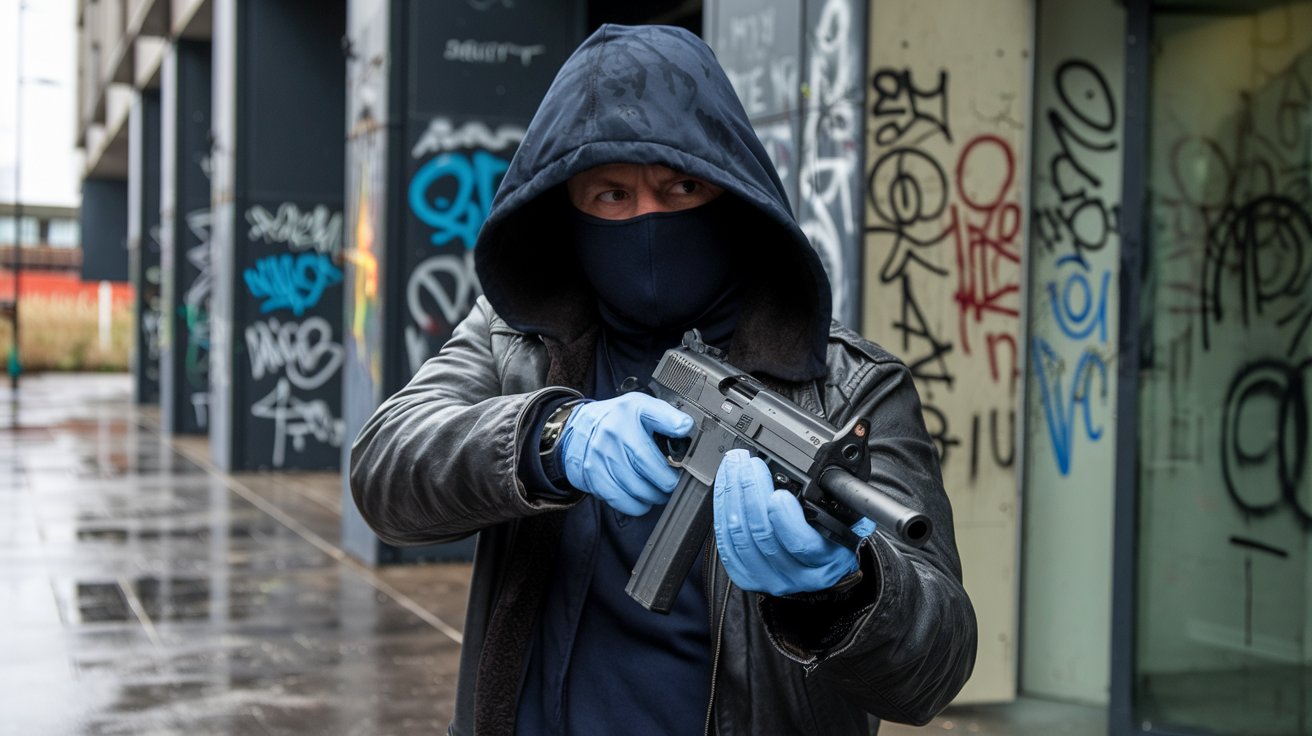
Vigilantes have always captured our imagination, often portrayed as masked heroes taking justice into their own hands. But who are these individuals, really? Vigilantes are people who act outside the law to enforce what they believe is right. They often emerge in societies where the legal system is seen as ineffective or corrupt. From the Wild West's legendary figures to modern-day urban avengers, vigilantes come in many forms. Some are celebrated as heroes, while others are condemned as criminals. This post dives into 35 intriguing facts about vigilantes, shedding light on their motivations, methods, and the impact they have on society. Buckle up for a thrilling ride through the world of those who dare to defy the law in the name of justice!
Key Takeaways:
- Vigilantes are individuals who take the law into their own hands when they feel the legal system is failing. They can be found in historical and modern contexts, often operating anonymously to protect their identities.
- Vigilantes have a significant presence in popular culture, with famous examples like Batman and The Punisher. However, their actions raise ethical questions and can sometimes escalate violence, leading to debates about their effectiveness and morality.
Vigilantes: Who Are They?
Vigilantes have always captured the public's imagination. These individuals take the law into their own hands, often operating outside the boundaries of legal systems. Here are some fascinating facts about vigilantes.
-
Vigilantes often emerge in societies where people feel the legal system is failing. When justice seems out of reach, some individuals decide to act on their own.
-
The term "vigilante" comes from the Spanish word "vigilante," meaning "watchman" or "guard." This reflects their role in keeping an eye on their communities.
-
Vigilantes can be found in both historical and modern contexts. From the Wild West to urban neighborhoods, they appear wherever there's a perceived need for justice.
-
Many vigilantes operate anonymously. They often wear masks or use pseudonyms to protect their identities and avoid legal repercussions.
-
Some vigilantes become folk heroes. Figures like Robin Hood and Zorro are celebrated for their efforts to help the oppressed.
Historical Vigilantes
Throughout history, vigilantes have taken on various forms and roles. Here are some notable examples.
-
The Ku Klux Klan started as a vigilante group. Initially, they claimed to protect Southern whites during Reconstruction but quickly became infamous for their violent racism.
-
The Pinkerton National Detective Agency was hired to combat vigilantes. In the late 19th century, this private security firm often clashed with vigilante groups in the American West.
-
The Bald Knobbers were a vigilante group in Missouri. Formed in the 1880s, they initially aimed to combat lawlessness but eventually became known for their own violent acts.
-
San Francisco's Committee of Vigilance was formed in 1851. This group sought to combat rampant crime and corruption during the Gold Rush era.
-
The Regulators were a group of vigilantes in North Carolina. In the 1760s, they fought against corrupt colonial officials and unfair taxation.
Modern-Day Vigilantes
Even today, vigilantes continue to make headlines. Here are some modern examples.
-
Phoenix Jones is a real-life superhero in Seattle. This masked vigilante patrols the streets, aiming to prevent crime and assist those in need.
-
The Guardian Angels are a volunteer group founded in 1979. They patrol subways and streets in various cities, aiming to deter crime through their presence.
-
In South Africa, vigilante groups combat gang violence. These groups often form in response to high crime rates and ineffective policing.
-
In Mexico, vigilantes fight against drug cartels. Known as "autodefensas," these groups take up arms to protect their communities from cartel violence.
-
In India, "cow vigilantes" target those they suspect of harming cows. These groups often operate with a mix of religious and cultural motivations.
Vigilantes in Popular Culture
Vigilantes have a significant presence in movies, TV shows, and comic books. Here are some iconic examples.
-
Batman is one of the most famous fictional vigilantes. This DC Comics character fights crime in Gotham City, often operating outside the law.
-
The Punisher is another well-known vigilante. This Marvel Comics character seeks revenge on criminals after his family is murdered.
-
The TV show "Dexter" features a vigilante serial killer. Dexter Morgan targets other killers, believing he's delivering justice.
-
"V for Vendetta" features a masked vigilante named V. This character fights against a totalitarian regime in a dystopian future.
-
The movie "Death Wish" stars Charles Bronson as a vigilante. After his family is attacked, he takes the law into his own hands.
The Ethics of Vigilantism
The actions of vigilantes raise important ethical questions. Here are some points to consider.
-
Vigilantism often involves breaking the law. Even if their intentions are good, vigilantes operate outside legal boundaries.
-
Vigilantes can undermine the legal system. By taking justice into their own hands, they may erode trust in official law enforcement.
-
The morality of vigilantism is often debated. Some see vigilantes as heroes, while others view them as dangerous criminals.
-
Vigilantes can sometimes escalate violence. Their actions may provoke retaliation, leading to cycles of violence.
-
The effectiveness of vigilantism is questionable. While some vigilantes achieve their goals, others cause more harm than good.
Famous Vigilante Groups
Certain groups have become well-known for their vigilante activities. Here are a few examples.
-
The Minutemen are a modern vigilante group. They patrol the U.S.-Mexico border, aiming to prevent illegal immigration.
-
The Black Panther Party had vigilante elements. While primarily a political organization, they sometimes took direct action against perceived injustices.
-
The Guardian Angels, mentioned earlier, are a notable vigilante group. Their distinctive red berets make them easily recognizable.
-
The White League was a vigilante group in the Reconstruction-era South. They aimed to restore white supremacy through violence and intimidation.
-
The Montana Vigilantes were active in the 1860s. They formed to combat rampant crime in the mining camps of Montana Territory.
Vigilantes and the Media
Media coverage can influence public perception of vigilantes. Here are some ways this happens.
-
News outlets often sensationalize vigilante actions. This can lead to increased public support or condemnation.
-
Social media gives vigilantes a platform. They can share their actions and gain followers, sometimes even organizing online.
-
Movies and TV shows can glamorize vigilantism. This portrayal can inspire real-life vigilantes or shape public opinion.
-
Journalists sometimes investigate vigilante groups. Their reports can bring attention to the issues these groups address.
-
Public opinion on vigilantes is often divided. Some see them as necessary heroes, while others view them as dangerous outlaws.
Vigilantes: The Final Word
Vigilantes have always fascinated us. They operate outside the law, driven by a personal sense of justice. From historical figures like Robin Hood to modern-day heroes in comic books, these individuals often blur the lines between right and wrong. While some see them as necessary protectors, others view them as dangerous outlaws. Their actions can spark debates about morality, justice, and the role of law enforcement.
Understanding vigilantes helps us grasp broader societal issues. They reflect our desires for justice and our frustrations with legal systems. Whether you admire or criticize them, vigilantes challenge us to think deeply about justice and accountability. Their stories, real or fictional, remind us that the quest for justice is complex and often controversial. Keep these facts in mind next time you encounter a tale of vigilante justice.
Frequently Asked Questions
Was this page helpful?
Our commitment to delivering trustworthy and engaging content is at the heart of what we do. Each fact on our site is contributed by real users like you, bringing a wealth of diverse insights and information. To ensure the highest standards of accuracy and reliability, our dedicated editors meticulously review each submission. This process guarantees that the facts we share are not only fascinating but also credible. Trust in our commitment to quality and authenticity as you explore and learn with us.


